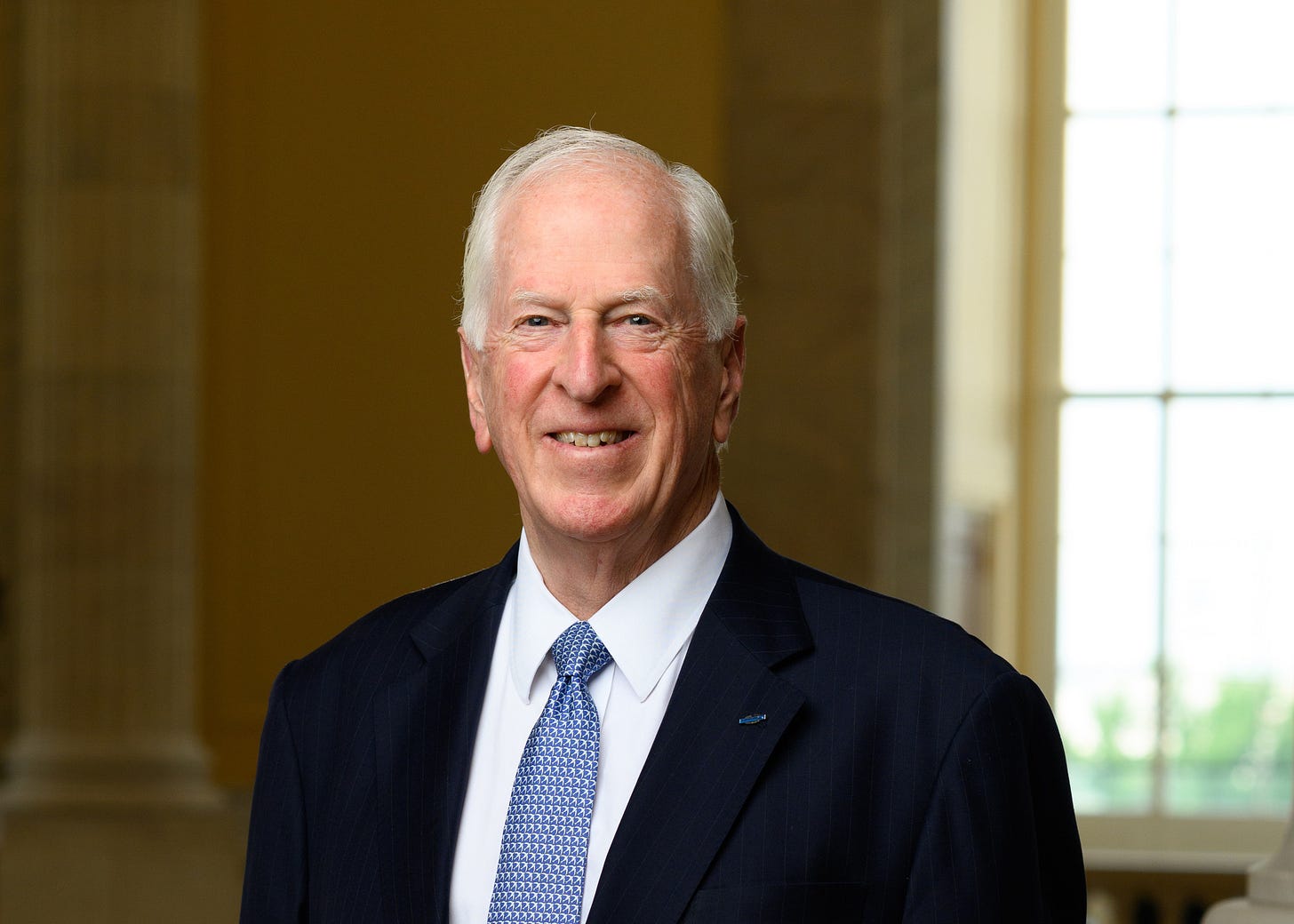The devastating fires in Los Angeles County have left many in need, and thanks to our readers, we’ve been able to help. Because of your support, Napa Valley Features donated $300 in January to the Los Angeles Regional Food Bank. Due to the ongoing need and the generosity of our community, we’re extending this effort through Feb. 15, with 10% of all new paid subscriptions going toward relief. Your support truly makes a difference — thank you.
Editor's Note: In place of our usual “Sunday E-dition,” we’re sharing special coverage of a recent town hall. Look for our regular edition next week.
Data, Dollars & Democracy —Thompson Sounds Alarm on Federal Overreach
By Sasha Paulsen
NAPA VALLEY, Calif. — U.S. Rep. Mike Thompson (4th District, California) California) hosted a Zoom town hall on Feb. 6, but the 1,000-participant limit was quickly reached, leaving many unable to join. The substantial overflow was directed to his Facebook page as the Democratic congressman, whose district includes Napa County, spent an hour fielding questions from constituents about developments in Washington, D.C., and the actions he and his colleagues are taking in response.
“As you know, in D.C. things have been pretty chaotic,” Thompson said. “I’ve heard from thousands of you with concerns about some of the actions of the new administration. The phones in my offices have been ringing off the hook. Back home this weekend, I couldn’t turn around without being stopped by someone who had concerns about what was going on. Please know that I share those concerns.”
Thompson described the situation as “Project 2025 playing out before our eyes,” referring to the 900-page playbook published by the American conservative think tank The Heritage Foundation in anticipation of Donald Trump winning the 2024 presidential election and outlining a plan for the dismantling of the U.S. government.
“This is unprecedented,” Thompson said. “There’s no one on this Zoom who’s ever experienced this.”
"At best, the administration giving DOGE access to your personal data is a constitutional overreach; at worst, this is the unlawful disclosure of financial records by someone who has never been on the government payroll, who’s employing teenage interns to comb through your data.” — Rep. Mike Thompson
He referred to the strategy at work, as described by Trump’s political advisor Steve Bannon and his personal lawyer, Ty Cobb: “This is what they call ‘flooding the zone’ with as much unconstitutional stuff as they can, as much illegal stuff as they can to see what will stick. Everything that (Trump) has done so far, he has either walked it back or the courts have walked it back. Even in areas when the president has lawful jurisdiction, his actions have threatened Americans. He started and stopped tariffs, but the threat of future tariffs hangs over us.”
Thompson noted that the war in Ukraine has not ended, and the price of eggs has not gone down, two things Trump had promised to do on Day One of his administration, “and now butter is seven bucks a pound.”
DOGE and the Law
In the forefront of questions were the actions of DOGE, the “Department of Government Efficiency,” created by President Trump and headed by billionaire Elon Musk. According to varying reports, Musk donated somewhere between $288 and $300 million to influence the 2024 election.
DOGE is not a Cabinet-level department of the U.S. government, which requires approval the Congress.
At the start of the town meeting, 882 people responded to a poll answer about the DOGE’s invasion of government institutions in which 90% replied, “Yes, I am extremely concerned about DOGE access to personal data,” 8% responded “somewhat concerned” and 2% that they were “not concerned.”
“This is a trend we are seeing across the country,” Thompson said.
“I agree that a lot of people voted to shake things up, but this is not the way to go,” he said, adding that he doubted that many voters wanted Musk’s team to have access to their personal, medical and taxpayer information.
“It’s a real problem when the government – our government – provides unfettered access to Americans’ medical, financial and veterans’ records to someone who was never elected nor vetted for the office or for so much as a security clearance,” Thompson said.
Thompson, a member of the Ways and Means Committee, said his committee “has jurisdiction over most of these things, and just this afternoon we held a press conference, sounding the alarm about the DOGE unlawful access to taxpayer data.
“At best, the administration giving DOGE access to your personal data is a constitutional overreach; at worst, this is the unlawful disclosure of financial records by someone who has never been on the government payroll, who’s employing teenage interns to comb through your data.
“This is serious. Federal law makes it unlawful for unauthorized people to view taxpayer data. Violating this statute is a felony, and it’s punishable by up to $5,000 in a fine and up five years in prison, and that’s for each piece of data that’s shared.”
Thompson said the DOGE efforts have extended into the Department of Veterans Affairs.
“I believe this is part of an effort to move toward the privatization of the veteran services. I don’t know any Republican veteran who wants this,” said Thompson, who served in the U.S. Army.
“I don’t know any Republican veterans who want to open their medical files or financial or privatize the veterans’ services.”
Watch a YouTube of the Virtual Town Hall Meeting
Other Issues
“There are other issues that should concern us all,” Thompson said. “The dangerous federal funding freeze, although temporarily blocked by the courts, is still causing major problems throughout our district, and I am talking to my colleagues who are seeing those same problems in their districts.
“The illegal freezing of funding is still having a terrible impact across the country. In our district alone, I’m hearing from constituents who are unable to get the funding they need to do local fire-mitigation projects, clean up toxic wastes, for training programs for young farmers, and it’s causing terrible problems with regard to important health research … you can’t just start and stop medical research.
“I hate waste, fraud and abuse as much as anyone,” Thompson said, “but if that’s your goal, the last thing you want to do is fire your inspectors general.
“It’s more accurate to say they’re tying to eliminate everything they can to ‘save money’ because, as you know, their tax cuts from 2017 expire and they’re trying to extend it. If they extend it in the form it’s in today, it’s going to cost $5 trillion dollars. If they add to it all the campaign promises, that number goes up to $16 trillion, and that tax cut will benefit the richest people among us and corporations. It does the least for working families and others lower on the economic spectrum.”
Questions from viewers ranged over a gamut of issues, from Trump’s interference in California water management to “Can you bring in the military to remove the president and Elon Musk due to their illegal activity?”
Thompson responded to the latter question by saying that rather than resort to the military, “We’re going to do it in Congress, in the courts and in the court of public opinion.
“My colleagues and I are working around the clock to ensure that this administration follows the rule of law. I’ve heard from a lot of you wondering what we are doing. We are working on this. It won’t be accomplished with a snap of a finger. It’s going to take a lot of work, a lot of organization and compliance with the law. We’re a nation of laws, and that’s what really sets us apart from many nations and makes us the great country that we are.”
Describing examples of efforts he and colleagues in Congress are undertaking, Thompson included:
Opposing attempts to defund Medicaid and other important programs,
Introducing legislation to prevent unlawful access to taxpayer data,
Supporting some 20 lawsuits against the unlawful freezing of federal funds, the firing of inspectors general, wrongful termination of civil servants and more.
He also cited the introduction of a congressional resolution, “which is an option in the House that demands that the Treasury Department answer questions that you and I and all Americans should have about the safety of their personal, financial and tax data as well as what is being done with that.
“This is only a start of the work that we’re doing to protect your privacy and security, and we’re not going to stop,” Thompson said. “We’re going to stay on this to be sure that the rule of law is followed.”
"Talk, tell your friends, tell your story If you have been affected by this, I want to know about it. It’s important for every member of Congress to hear how this is affecting their constituents. We need to understand the impact on our county and all across the country." — Rep. Mike Thompson
Other questions included Trump’s proposal to take over Gaza, which he called “beyond insane,” as well as the fate of the Department of Education, to which Thompson said, “If they spent half much time trying to improve our public schools as they are trying to shut down public education, we’d be light-years ahead.”
One viewer asked, “Are the banks safe? Thompson replied, “I believe they are safe, but there is a danger.”
On the question of confirmation of Trump’s nominees for Cabinet posts, in particular Robert F. Kennedy Jr. as Secretary of Health and Human Services, Thompson commented, “If Joe Biden had nominated that person, there wouldn’t be one Republican for him and few Democrats, either.”
Asked about the Trump proposal to put conditions on federal aid to rebuild Los Angeles, Thompson listed the number of natural disasters in “red” states — including floods, tornados and hurricanes — where Democrats had supported federal assistance. “When Americans need help, we respond, and we don’t put conditions on it.”
To the question, “What can we do?” including, “What can we do to support you?” Thompson replied, “You need to speak up. Make sure that your friends, neighbors, allies and adversaries know what’s going on. And if you are being affected by the actions of the administration, let me know.”
Thompson described phone calls from constituents that included one woman, a 20-year employee in U.S. intelligence with USAID, posted overseas, who told him she was terminated and given 48 hours to pack up everything she owns and leave.
“That’s no way to treat a loyal, hard-working government employee, but it’s probably illegal and it’s creating a lot of problems in our intelligence space and national security,” he said.
“Talk, tell your friends, tell your story If you have been affected by this, I want to know about it. It’s important for every member of Congress to hear how this is affecting their constituents. We need to understand the impact on our county and all across the country.”
Thompson said he will be holding in-person town halls throughout his district “throughout the year,” and he encouraged constituents to email questions to Thompson.townhall@mail.house.gov.
Todays’ Polls
If today’s story captured your interest, explore these related articles:
The Silent Invasion — The Mediterranean Oak Borer’s Threat Grows
Under the Hood: Heat Spike Intensifies Napa's Wine Industry Challenges
Under the Hood: Living With Fire in Northern California's Wine Country
Under the Hood: Napa Valley 2024 Has High Quality but Low Demand
Under the Hood: Deepening Crisis — Pressures Reshaping Napa Valley’s Wine Industry
Under the Hood: Climate Change's Growing Impact on Napa Valley
Under the Hood: Navigating the Future of the Napa Valley Model
Under the Hood: Slowing Travel, Declining Wine Demand Threaten Napa Valley
Under the Hood: Napa County Faces Economic Challenges Due to Aging, Decreasing Population
Explore all Napa Valley Features stories on our main page.
Sasha Paulsen is a Napa Valley-based novelist and journalist.
Last Week
Tim Carl examined Napa Valley's escalating insurance crisis in "Napa Valley’s Growing Insurance Crisis," highlighting how rising wildfire risks and mounting costs are reshaping the region's housing market and economy. The devastating January wildfires in Los Angeles reinforced insurers' hesitancy to cover high-risk areas, leaving Napa homeowners and businesses facing soaring premiums or loss of coverage. While state officials and local leaders push for regulatory reforms and fire-mitigation efforts, many residents struggle to find affordable options. Experts debate whether Proposition 103, which limits insurers' ability to adjust rates based on future climate risks, contributes to the crisis. Without meaningful policy changes, the future of property ownership and business viability in Napa Valley remains uncertain.
Kathleen Scavone explored the prehistoric past of Napa Valley in "Pondering the Past: Mammoths and More," highlighting the region's role in what researchers call the "California Serengeti" during the Ice Age. She recounted the discovery of a mammoth molar in Lake County and shared insights from archaeologist E. Breck Parkman, who suggested that Napa Valley once supported herds of mammoths, bison and other large herbivores, as well as predators such as saber-toothed cats and short-faced bears. Parkman theorized that migratory patterns brought these animals through Napa as they moved between coastal and inland pastures. Fossil evidence might remain undiscovered due to agricultural development, but researchers believe the valley was once home to a thriving ecosystem. As the Ice Age ended, extinction and environmental shifts allowed species like grizzly and black bears to expand their territories.
Dan Berger explored the rising prominence of cabernet franc in "Francly, It’s the Future," highlighting how the variety is gaining recognition in Napa Valley and beyond. He contrasted its elegant, food-friendly characteristics with the more tannic cabernet sauvignon and noted that winemakers are increasingly embracing its potential as climate change alters growing conditions. While still a niche varietal, cabernet franc is now commanding higher prices per ton than cabernet sauvignon, and producers such as Lang & Reed and Livermore Valley’s Steven Kent Mirassou are leading the way in crafting refined expressions. Berger suggested that shifting consumer and winemaker preferences could position cabernet franc as a more climate-resilient alternative in California’s wine industry.
Georgeanne Brennan shared her experiences with foraging in "Wild Mushroom Season," recounting how she learned the practice in France and later applied it in Northern California. She emphasized the importance of expert identification to avoid poisonous varieties and recommended regional mycological societies for guidance. While foraging conditions vary by season and location, she noted that wild mushrooms such as morels, chanterelles and black trumpets can also be purchased from farmers markets and specialty vendors. She highlighted several resources for mushroom enthusiasts and included recipes showcasing the unique flavors of wild and cultivated varieties.
Rainer Hoenicke explored the benefits of shade gardening in "Take Advantage of Shady Spots for Lovely Gardens," offering insights on how to cultivate plants in low-light conditions. He shared personal experiences experimenting with various species under different types of tree canopies, noting that many native and non-native plants can thrive in dry shade. Observing the movement of sunlight throughout the year is key to selecting the right plants, as some can adapt to partial or filtered light. He also emphasized the importance of trial and error, documenting plant growth, and making adjustments as needed. Shade gardening, he suggested, can bring as much enjoyment as traditional sun-filled gardens.
Swan Day highlighted the career of Beth Heid in "Chamber Orchestra Concert Will Feature Beth Heid," detailing her journey from Napa Valley school orchestras to an international music career. Heid, who began playing violin as a child, later pursued music at the University of the Pacific and performed with the Mexico City Philharmonic before returning to Napa. She balanced a career in education while continuing to play with local symphonies and chamber ensembles. Now retired, she remains an active musician and will perform a viola solo in Max Bruch’s “Romance” with the Napa Valley Chamber Orchestra on Feb. 23.











Presidents Trump and Musk--and apparently the whole of the Republican party--think that cutting federal spending and eliminating agencies duly constituted by acts of Congress is such an emergency that it requires suspending Article I Section 8 of the Constitution.
I’d like to stop all of Elon Musk’s activities until we can have that debate properly. And while we’re having that debate, we should put a moratorium on lies about condoms in Gaza and such.
I need to hear why the Presidents’ goals require ignoring the Constitution.
Thank you as always for providing good insight on a number of issues of concern to many. I seriously hope that the President will soon stop his distraction campaign and the non-elected Musk will be restrained or better- removed- so that many of our important processes, guidelines and legislation can once again guide us forward.